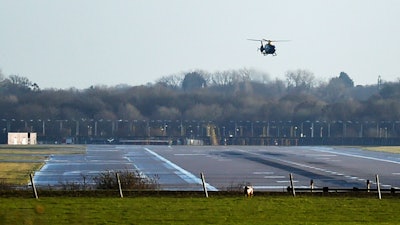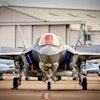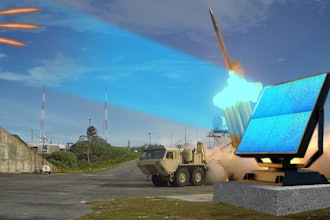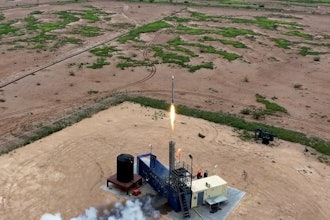
Tens of thousands of passengers were delayed, diverted or stuck on planes Thursday as the only runway at Britain's Gatwick Airport remained closed into a second day after drones were spotted over the airfield.
The airport south of London — Britain's second-busiest by passenger numbers — closed its runway Wednesday evening after two drones were spotted.
It reopened briefly at about 3 a.m. Thursday, but shut 45 minutes later after further sighting and remained closed at midday — 15 hours after the first sighting.
Police said the "devices used are of an industrial specification," an indication that the drones weren't small, inexpensive machines. A police helicopter was hovering near the airfield as officers from two nearby forces hunted the drone operators.
"The police advice is that it would be dangerous to seek to shoot the drone down because of what may happen to the stray bullets," said Chris Woodroofe, Gatwick's chief operating officer.
Eurocontrol, an international organization devoted to air safety across Europe, said on its website that the airport was expected to stay shut until at least 1800 GMT (1 p.m. EST).
Woodroofe said sightings of at least one drone were continuing, and "I cannot tell you what time we will reopen."
He said the vast majority of the 110,000 passengers due to pass through Gatwick on Thursday — one of the busiest travel days of the year — would experience disruption.
All incoming and outgoing flights were suspended, and the airport's two terminals were jammed with thousands of weary travelers, many of whom had spent the night on benches and floors.
Police said the drone flights were a "deliberate act to disrupt the airport," but that there were "absolutely no indications to suggest this is terror-related."
There were 20 police units from two forces searching for the elusive drone operator.
Superintendent Justin Burtenshaw, of Sussex Police, said the search was daunting.
"Each time we believe we get close to the operator, the drone disappears; when we look to reopen the airfield, the drone reappears," he said.
Burtenshaw said new and bigger drones have more reach, making it harder for police to locate the personal control the flying device.
"It's a difficult and challenging thing to locate them, but I've got teams now and I've got investigators looking at how we do that, and I'm confident we will," he said.
Gatwick, about 30 miles (45 kilometers) south of London, sees more than 43 million passengers a year to short- and long-haul destinations and serves as a major hub for the budget carrier easyJet.
Any problem at Gatwick causes a ripple effect throughout Britain and continental Europe, particularly during a holiday period when air traffic control systems are under strain.
Passengers complained on Twitter that their Gatwick-bound flights had landed at London Heathrow, Manchester, Birmingham and other cities.
Luke McComiskie, who landed in Manchester — more than 160 miles (260 kilometers) from London — said the situation "was just chaos, and they had only two coaches (buses) and taxis charging people 600 pounds ($760) to get to Gatwick."
Andri Kyprianou, from Cyprus, described "freezing" conditions for passengers who spent the night at Gatwick's South Terminal. Her flight to Kiev had been canceled.
"I haven't slept since yesterday morning. We are very tired. It's freezing, we are cold, having to wear all of these coats for extra blankets," she said.
"There were pregnant women, one of them was sleeping on the floor. There were people with small babies in here overnight. We saw disabled people on chairs. There were young children sleeping on the floor."
Gatwick briefly closed its runway last year when a drone was spotted in the area. An errant drone also briefly led to the shutdown of Dubai International Airport in October 2016.
Pilots have reported numerous near-misses with drones in recent years in Britain, and aviation authorities have warned there is a growing risk that a midair collision could cause a major disaster.
Strong sales of small consumer drones have led to repeated warnings about a possible threat to commercial aviation.
Britain has toughened its laws on drones, and flying one within 1 kilometer (0.6 miles) of an airport carries a maximum penalty of five years in prison.
But opposition politicians accused the government of failing to do enough, pointing out that a registration system with safety checks for drone operators wouldn't take effect until November.
Christopher Lister, whose flight from Kiev, Ukraine, to Gatwick was diverted to Birmingham in central England, said the scale of the disruption was "a little bit scary."
"We feel grateful it's not a worse story this morning about an aircraft (that has) come down," he told the BBC.






















